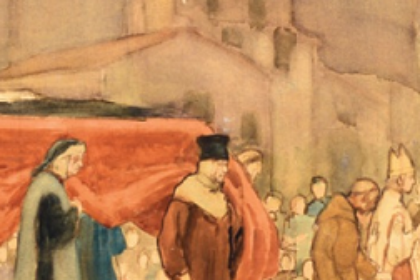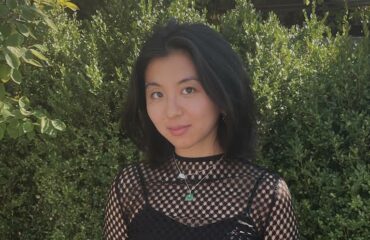FIVE STORIES by Karen Brennan

STILL LIFE
A man told me there was nothing he would rather keep noticing—and he pointed to the spaces between palm fronds, chinks of turquoise and a few clouds. Just now, into this recollection, wanders an egg on a green dish.
DISTANT NURSE
On library card stock I have written either Distant Noise or Distant Nurse. The former, with its taint of oxymoron, suggests the story of an enchanted chain-saw marooned on a desert island. The latter evokes the severe hair and pointed chin of a person from my past.
HOMELESS CAT
Into our lives comes a small cat, scratching at the screen door, its expression weary and disillusioned. Oh come in, we say, and we give it a little saucer of milk, which it laps up. Then it begins to talk to us in our own language. It is full of complaints concerning the economy, the world energy situation and life on this planet, the great mystery being that we weren’t consulted, we are helpless pawns of the universe, yadda-yadda. In other words, not only a smart cat, but a phenomenally bitter cat.
MOUSE CHOIR, AN OPERA
1. Today a mouse choir will perform for us Verdi’s la donna e mobile, which means woman is fickle.
2. The mice with their weak chins and strong noses have ferreted out our desires which are otherwise secret.
3. Kafka had a habit of incorporating mice into fiction.
4. Our desires are not so extraordinary, claims Rigoletto, a grotesque dwarf.
5. Adorable in bonnets and knee socks, they approach the stage like a band of 3 year olds, uncertain of what is required, bewildered…
6. Kafka had a habit of visiting prostitutes.
7. Verdi began an affair with a soprano “at the twilight of her career.”
8. They assemble in a pool of greyness.
9. There was, for example, one called Josephine, a soulful queen.
10. woman is fickle woman is fickle they will soon sing, but they know not what they sing.
11. We, on the other hand, with our hidden desires, our secret yearnings…
12. How we long to be placed in another era, among a new crop of mice!
13. Before singing, it is customary to squeak a little
14. as if pumping the air out of a room.
THE CORPSE AND ITS ADMIRERS
The coffin is grey with gold curlicues at the corners, at each of the four corners, although we only see two from where we are sitting with our mother. Each curlicue of a golden color has a shiny ring of silver around it and then some dots. The dots are very small.
The oak casket is very big. It is 10 feet. Maybe it is 20 feet. The feet of the corpse jut up from it since it is a shallow casket. Picture a pork chop in a crepe pan and that is how the body looks in the casket: jutting up, the nose pointed and white, the feet in their brown cordovans.
Our mother is crying. She is fishing around in her patent leather purse while crying and her face is very red and ugly. Picture a wadded up piece of cloth soaked in bloody nose damage and you will get the feeling of her face. In her patent leather purse are the following items: sunglasses, a movie ticket stub from The Paradine Case starring
Gregory Peck who falls in love with an imprisoned woman, Kleenex, lifesavers, both of which are in blue and white packages.
For a murderess, the Paradine woman is exceptionally well-dressed.
The purse of our mother has a gold clasp shaped like a fish.
Also there is some change at the bottom and some flakes of tobacco, given that our mother is trying to quit smoking cigarettes.
We are embarrassed at the noises our mother makes when she weeps. Picture a siren interrupted by a braying sheep and also a coughing giant and you will have some idea how she sounds.
I myself am sewing a sleeve on a blouse.
The corpse does nothing. This is its advantage. There is a fly on the casket, resting languidly on one of the blond oak lintels. In a bad mood.
Now, my sister whispers, he will have no more bad moods.
I myself nod wisely, the blouse which is of a silky and thus slippery material slithers around on my little lap.
Yes, I say. I have only 10 stitches to go. Maybe 20. Then I will sew a little something onto my sister’s head who has begged me for some time to do this.
The corpse’s nose is long and white-tipped. From here we can only imagine the soft flare of the nostrils. Or maybe it is a hard flare. We can vaguely recall the teeth, yellow from the smoking of Pall Malls.
My mother who has given up smoking now removes a black veil from her purse. 10 feet long. Or 20 feet. Very long, it unfolds and unfolds, it seems this unfolding will go on forever, my sister Razor whispers to me, and soon we are covered in it, like insects trapped in a spider’s web.
My mother is bald and so is my sister. Once, at her request, I stitched the words WEIRD ZONE onto my mother’s scalp.
My father, who is dead, is not a skinhead but a corpse.
My mother covers us with her veil, still weeping, still shuddering under the veil but now we are part of that shuddering since, beneath the spider web veil, my sister, my mother and I make one shape.
We are thus part of the shape of my mother.
My father is crying in his casket but his tears are the tears of corpses which go inward and keep the body from thawing and melting away.
The blouse is made of vinyl (I think) and has little rubber buttons. I am sewing the sleeve, I just realized, in the wrong place.
Inside the coffin my father is sneezing. My mother reaches into her purse. Once more she reaches into it and this time removes a half dozen tacos which she divides among us. Then salsa and little plates of rice. Then spoons.
My father, when alive, was not a stitcher. He was not an eater. He had his moods which hammered themselves into our tumbling home, into our mother’s makeshift spirit. He was not a weeper.
No thank you, I tell our mother. Even so, I cannot seem to work up an appetite. The corpse is still sneezing and weeping, more copiously now: picture a jackhammer drilling into a human brain and you will have some idea of the racket which is beginning to assert itself into the air surrounding the coffin.
Perhaps he has allergies, my sister whispers.
All the while I am stitching the sleeve on the blouse—and it is going much, much better now, thanks for asking, creating a neat little seam in the shape of scythe. I am trying to think of a prayer to say for my father’s soul and the effort to do so makes me recall several moments: jumping rope, my father at one end, laughing with his mouth full; or driving over the bridge, my father saying he was frightened and so could not look; or singing for him at a large party and his face beaming and beaming. Hard to believe a face so white and frozen could have beamed so warmly or that in the cave of his arm we had felt so protected. Nevertheless.
The Paradine woman, a master of duplicity, manages to destroy Gregory Peck who she hates for luring her lover (Louis Jordan) into suicide. His career over, his love unrequited and disdained, he returns to his nice wife (Ann Todd) who comforts him like a mother.
Not that our own mother is all that comforting. She distributes tacos from her voluminous purse and now she is chewing loudly. So many noises in this room! My mother chewing and swallowing, my father weeping and sneezing, my sister whispering, and I am making the sound of she who stitches a sleeve onto a blouse and who will soon stitch a little something onto the scalp of my sister.
The great moral lesson of The Paradine Case is that we should not trust attractive foreigners, no matter how beautifully dressed. Another way of saying this is that we must stay within our familiar realm and not venture forth. Don’t flirt with danger. Be safe. Or for me, a stitch in time saves nine.
Now that the father is dead, our lives will surely change. He who had been our armor, our jailer. He who stabbed us with his words and then caressed us. We who were stabbed, then caressed, defended and incarcerated. We may have murdered him, too.
At some point it occurs to me that we are all everything, that nothing separates us. Picture a parade of ants going toward a picnic arranged on a red-and-white checked tablecloth and then picture a foot coming down. We are all things. The ants, the picnic and the foot.

